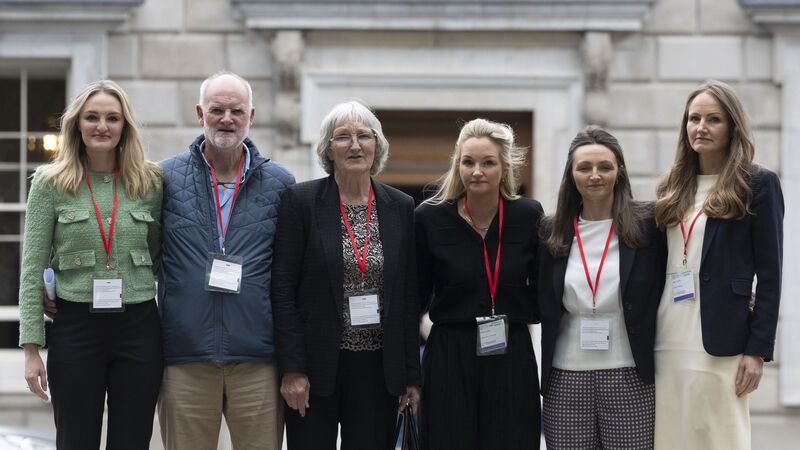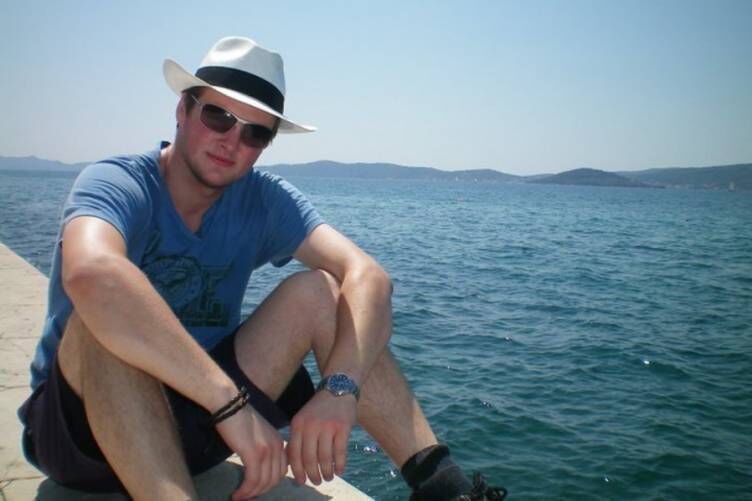Mick Clifford: Shane O’Farrell case shows the State still protects itself, not its people

Hannah, Jim, Lucia, Gemma, Aimee and Pia O’Farrell at Leinster House to hear an apology over the circumstances of the death of Shane O’Farrell.
On Tuesday, the State apologised to citizens it had wronged. The sovereignty of citizens is what separates democracies from authoritarian or totalitarian states. Nominally, the State and its servants are there to protect and serve the citizens, to uphold their rights.
Shane O’Farrell didn’t receive the protection to which he was entitled. He died on August 2, 2011, when a car driven by Zigimantas Gridziuska crashed into his bicycle outside Carrigmacross, Co Monaghan. Gridziuska should have been in prison at the time as he had repeatedly broken bail conditions.
Shane’s mother, Lucia, conducted a campaign for the last near 14 years to achieve some degree of justice for her son. The culmination of that was the apology to the O’Farrell family from minster for justice Jim O’Callaghan in the Dáil on Tuesday.

O’Callaghan can be commended for giving an apology that should have come years ago. Instead, up until this point, Lucia O’Farrell met resistance at every turn in her campaign to uncover the truth.
It might also be posited that even at this late stage, the apology represented an adroit political move rather than a gesture by a contrite State. O’Callaghan was, in some ways, over a barrel.
Before his ascent to government, he had backed a campaign for a public inquiry into the case. As minister for justice, he couldn’t grant that because a 400-page scoping exercise conducted by a retired judge had recommended that a public inquiry wasn’t warranted.
So instead, he offers the apology, appoints a barrister to examine the bail laws and establishes a scholarship in Shane’s name in the law faculty in UCD, from where Shane had graduated the year before his death.
Still, O’Callaghan did more than any previous minister and the family were provided with an emotional day of vindication in the national parliament.
The trouble with the whole affair is that it took fourteen years to reach this level of conclusion. That’s 14 years out of every life in the O’Farrell family of two parents and four grown daughters, before the State would finally offer a modicum of contrition.
The culture in which such a cavalier attitude to wronged citizens exists was best summed up by Fianna Fáil TD John McGuinness, who had battled long on behalf of the O’Farrells.
McGuinness told the Dáil that Lucia O’Farrell had set out “to inform every one of us and to tell us to do our job — enough empathy, enough advice and enough assurances from politicians and officials: do your job as parliamentarians.”
He went on: “That is what she was asking, and to recognise what was wrong for her son and for many others who are confronted by a State that, as this obviously shows, could not care less.”
McGuinness has a track record of doing the right thing when it may not have been in his best political interests. He knows what he is talking about.
The culture of “the State” has always been to deny, deflect, prevaricate, defend anything that has been done, irrespective of wrongs or injustice visited on any citizen, or even fellow employee of the State. This route is gone down on the bogus premise that the public interest is better served by avoiding scandal or controversy. In reality, it’s about covering ass.
But who is the State? It is composed of public servants, elected politicians and volunteers who serve of boards of one State entity or another. They are probably collectively more concerned about the public interest than the average person. They go to work, nominally at least, fortified in the knowledge that they are serving the public.
Yet when something goes wrong, all bets are off. Now the individual seeking justice or vindication or to right a wrong is no longer regarded as a member of the pubic, but instead the enemy. Now a different priority is set out. Now it’s about making the troublemaker go away, silencing them, portraying them as the problem rather than somebody who just wants to right a wrong. Wherefore now the public interest?
We have seen this repeatedly in the treatment of whistleblowers across the public service, in the gardaí, in the health and social services. It is also what informs attitudes to people like Lucia O’Farrell who seek justice for a wrong done.
Look at the latest scandal, that of the report from Children’s Health Ireland published last weekend in . Among a litany of malpractice it highlighted how one consultant referred children from his public work to his private practice, against the rules and allegedly delaying treatment for the patient.
The report dates from 2021. Why was it never published? Why was the minister for health never informed? Who within the system was standing up for the wronged children? Would any of this have emerged if the matter hadn’t been reported in the media?
In the previous week details of a report into the performance of unnecessary surgeries on children’s hips was revealed. Again, the report was only published after media exposure.
This week it was revealed that four members of the CHI board have resigned. No doubt, these people took up their roles to do the State some service.
We need to know these things if there is to be any learnings taken from scandals concerning the health of children.
Look at the case of Daniel McAnespie, a 17-year-old boy who was murdered in 2010 while in State care. Daniel spent most of his highly vulnerable life relying on the State for care. It failed him miserably.
The inquest into his death earlier this month heard that in the months prior to his death, he begged social workers to “have him locked up”. Repeated applications were made to the HSE to seek a secure place for him but all were refused.
Who was responsible for the lack of care afforded to a boy who needed that care more than anybody? What was ever learned from the appalling lack of care given to him?
His family want an apology from the State. They are entitled to it, but that would require a cultural change in which agencies of the State stand up and take responsibility, admit that things were done wrong, that a citizen was not protected. There is no sign of any such cultural change anywhere in the State apparatus.
There is nothing irredeemable in bad things happening. A system can be so dysfunctional as to allow out on bail a repeat offender who should be legally locked up. A hospital consultant can betray his Hippocratic oath. A vulnerable boy can fall through the cracks in a system that is barely keeping things together.
What is scandalous, and remains so, is the reaction within the State apparatus to events like these. Instead of immediate contrition, urgent repairment and most particularly of all a thirst for learnings, there is a compulsion to bury every wrong and discredit anybody who questions it.
That has to change, and change can only come from the top.






